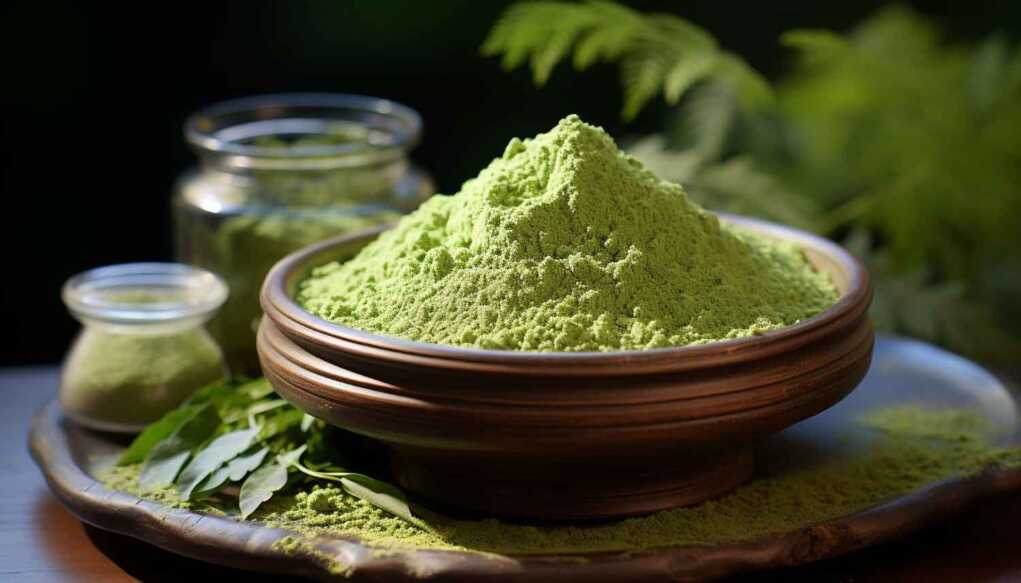
Several brands (such as Athletic Greens) and celebrities (Gwyneth Paltrow) have helped popularize the food trend. Find out if registered dietitians think it’s worth trying.
Green powders (vegetables that have been dried and pulverized) have become increasingly popular across social media — in particular, on TikTok. The hashtag #greenspowder has more than 200 million views, and TikTokers are raving about various health benefits that they attribute to powdered greens, such as clearer skin, boosted energy, and improved gut health. Among them, Maddie Stoy (23.8K followers) swears by the green stuff for its purported ability to ease bloating and digestion. Ali Archdeacon (63.1K followers) claims that green powder has banished her hormonal acne and made her eyes “brighter and whiter.”
Celebrities have been ahead of the trend. Gwyneth Paltrow, Oprah Winfrey, and Kate Winslet have sworn by green powder as a daily eating ritual. And the popular green powder brand Athletic Greens has big-time celebrity investors, including Hugh Jackman, Cindy Crawford, and Steve Aoki, reports Fast Company. So, is green powder (sometimes called greens powder) really the cure-all we’ve been waiting for? Here’s what to know.
What Are Powdered Greens?
Greens powder is a dietary supplement that aims to help people reach their daily intake of vegetables, vitamins, and minerals. In general, to consume it, you mix around 1 tablespoon (tbsp) of powder with 5 to 10 ounces (oz) of water to make a drinkable green juice, to be taken daily or as needed. One of the biggest selling points of greens powder is that the brands often contain plenty of superfoods. While each brand is different, common ingredients found in greens powder are:
- Leafy greens
- Other vegetables
- Seaweed
- Antioxidant-rich fruits
- Probiotics
- Herbs
- Natural extracts
- Grasses
According to the American Heart Association, American adults need four to five servings of fruit and four to five servings of veggies per day. Only an estimated 1 in 10 Americans meet those goals, per the Centers for Disease Control and Prevention (CDC). That’s where powdered greens may help. For example, if you were to consume one 8 gram (g) serving (one scoop or one packet) of Amazing Grass powdered greens per day, you’d get two servings of fruits and veggies, according to this product’s packaging.
Keep in mind that there isn’t rigorous research on the exact combinations in common powdered greens, so it’s unclear whether the nutrients supplemented in greens powder offer the same benefits as their whole-food counterparts. (More on this later.)
How Much Do Powdered Greens Cost?
It depends on the brand. Nonsubscription prices for a 30-serving bundle tend to range from about $39.99 (Amazing Grass) to $79 (Athletic Greens).
What Do Registered Dietitian-Nutritionists Think of Powdered Greens?
Although green powders may be pricier than fresh whole produce, they may have some merit. Sharon Palmer, RD, who is based in Ojai, California, says powdered greens can be a healthy supplement to a daily diet. “They can provide some of the nutrients found in greens, such as phytochemicals, vitamins, and minerals,” she says, adding that nutrients like vitamin C and vitamin E may fight inflammation and lower cholesterol. Kale, a common greens powder ingredient, contains 19 milligrams (mg) of vitamin C per cup, per data from the United States Department of Agriculture (USDA), an amount that is more than 20 percent of the daily value, according to the National Institutes of Health (NIH). Another greens powder favorite, broccoli, may help lower cholesterol, maintain healthy blood pressure, and improve cardiovascular function when eaten as a whole food, according to a research review published in 2023 in the journal Antibiotics (Basel).
Not a lot of robust research has been done on powdered greens specifically. One small study of 18 people found that fruit and vegetable powder taken daily over eight weeks led to an increase in antioxidants in the blood. Additional research is needed, however. For now, registered dietitians generally encourage their patients to get vitamins and minerals from whole foods rather than supplements. “Greens powders may not have all the nutrients found in a serving of leafy greens,” Palmer says.
It is also possible to “overdose” on fat-soluble vitamins such as vitamins A, D, E, and K, if your body is getting these nutrients from the foods you’re already eating and you add a powdered green product, says Abby Grimm, RDN, a registered dietitian at FWDfuel in Myrtle Beach, South Carolina. Grimm says they may also create gut imbalances. “For powders containing probiotics or other digestive support, it may not be the right strains or amounts for you personally,” she says.
Who Should Try (and Avoid) Powdered Greens?
Powdered greens may seem like an inventive way to get your daily dose of vitamins. But not everyone needs to take this kind of supplement, and in general, whole foods are preferable. Grimm recommends daily powder green juice for just a handful of groups, including people who struggle to eat enough veggies and drink enough water, and athletes with high calorie demands.
If you already feel good, you eat three to five servings of vegetables per day, or you are sensitive to supplements, Grimm says to steer clear of the green juice. Supplements are supposed to be tailored to your needs, and not everyone needs them. Plus, it is possible to get too much of certain nutrients, and if you already take vitamins or mineral supplements, adding powdered greens may put you over the daily limit of some nutrients. As with any supplement, you should check with your healthcare provider before taking anything new to make sure it won’t interact with any current medications or supplements you may be taking.
Grimm explains that while supplements may be effective for some people, “it’s important to undergo necessary testing or be evaluated by a nutrition expert to get a personalized supplement protocol for you.”
Summary
Generally, greens powder is good for you. The real question is whether it’s necessary. Palmer notes that people shouldn’t use greens powder to replace a nutrient-dense diet rich in whole foods. “A healthy diet [is] filled with a variety of vegetables and fruits,” she says. “If you refuse to eat greens, this is going to be better than nothing,”
Grimm notes that greens powder does not replace all the value you get from the actual green foods themselves. The bottom line: If you eat a wide range of fresh vegetables and have an overall dynamic whole-foods diet, you likely do not need to add powdered greens to your daily diet.
Additional reporting by Ashley Welch.
Editorial Sources and Fact-Checking
- Fruits and Vegetables Serving Sizes Infographic. American Heart Association.
- Lee S, et al. Adults Meeting Fruit and Vegetable Intake Recommendations — United States, 2019. Morbidity and Mortality Weekly Report. January 7, 2022.
- Bananas, Raw. United States Department of Agriculture (USDA). April 1, 2019.
- Syed R, et al. Broccoli: A Multi-Faceted Vegetable for Health: An In-Depth Review of Its Nutritional Attributes, Antimicrobial Abilities, and Anti-inflammatory Properties.
- Cramer J, et al. Sulforaphane Absorption and Excretion Following Ingestion of a Semi-Purified Broccoli Powder Rich in Glucoraphanin and Broccoli Sprouts in Healthy Men. Antibiotics (Basel). July 7, 2023.
- Dams S, et al. An Encapsulated Fruit, Vegetable and Berry Juice Powder Concentrate Increases Plasma Values of Specific Carotenoids and Vitamins. International Journal for Vitamin and Nutrition Research. November 15, 2019.
Important Notice: This article was originally published at www.everydayhealth.com by Katie Robinson where all credits are due. Medically reviewed by Lynn Grieger, RDN, CDCES
Disclaimer
The watching, interacting, and participation of any kind with anything on this page does not constitute or initiate a doctor-patient relationship with Dr. Farrah™. None of the statements here have been evaluated by the Food and Drug Administration (FDA). The products of Dr. Farrah™ are not intended to diagnose, treat, cure, or prevent any disease. The information being provided should only be considered for education and entertainment purposes only. If you feel that anything you see or hear may be of value to you on this page or on any other medium of any kind associated with, showing, or quoting anything relating to Dr. Farrah™ in any way at any time, you are encouraged to and agree to consult with a licensed healthcare professional in your area to discuss it. If you feel that you’re having a healthcare emergency, seek medical attention immediately. The views expressed here are simply either the views and opinions of Dr. Farrah™ or others appearing and are protected under the first amendment.
Dr. Farrah™ is a highly experienced Licensed Medical Doctor certified in evidence-based clinical nutrition, not some enthusiast, formulator, or medium promoting the wild and unrestrained use of nutrition products for health issues without clinical experience and scientific evidence of therapeutic benefit. Dr. Farrah™ has personally and keenly studied everything she recommends, and more importantly, she’s closely observed the reactions and results in a clinical setting countless times over the course of her career involving the treatment of over 150,000 patients.
Dr. Farrah™ promotes evidence-based natural approaches to health, which means integrating her individual scientific and clinical expertise with the best available external clinical evidence from systematic research. By individual clinical expertise, I refer to the proficiency and judgment that individual clinicians acquire through clinical experience and clinical practice.
Dr. Farrah™ does not make any representation or warranties with respect to the accuracy, applicability, fitness, or completeness of any multimedia content provided. Dr. Farrah™ does not warrant the performance, effectiveness, or applicability of any sites listed, linked, or referenced to, in, or by any multimedia content.
To be clear, the multimedia content is not intended to be a substitute for professional medical advice, diagnosis, or treatment. Always seek the advice of your physician or other qualified health providers with any questions you may have regarding a medical condition. Never disregard professional medical advice or delay in seeking it because of something you have read or seen in any website, video, image, or media of any kind. Dr. Farrah™ hereby disclaims any and all liability to any party for any direct, indirect, implied, punitive, special, incidental, or other consequential damages arising directly or indirectly from any use of the content, which is provided as is, and without warranties.








